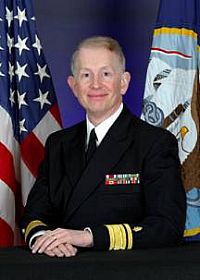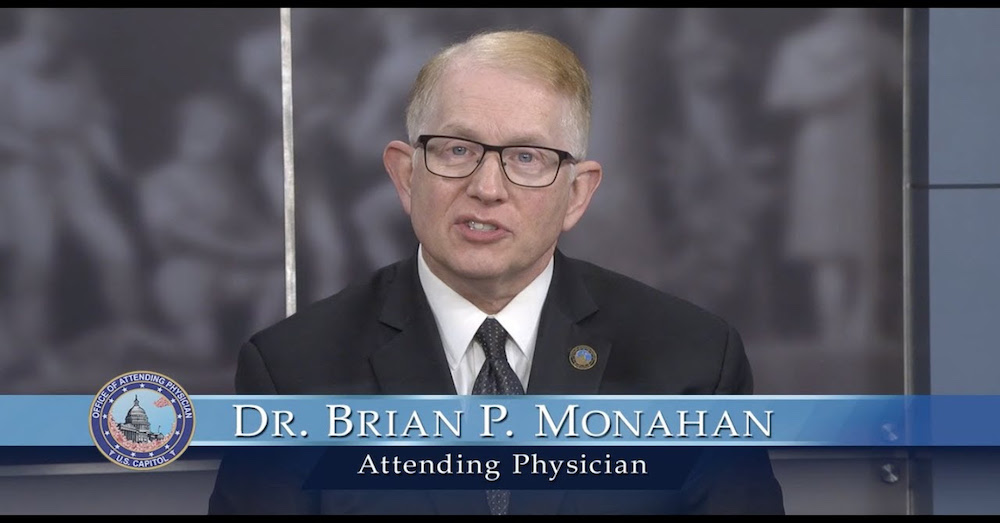By Tom Deignan
Dr. Brian Patrick Monahan is a rare creature in Washington these days. He is praised by both Democrats and Republicans.
“Throughout this (coronavirus) health crisis, the Senate, its members and our staffs have been lucky to have the steady leadership of Dr. Brian Monahan in our corner,” Republican Senate Majority Leader Mitch McConnell said in late May.
Dr. Monahan, McConnell added, “has responded with the same ability and professionalism that have benefited Congress and the Supreme Court for more than a decade… And we thank the good doctor for all he does for this institution and for his country.”

Dr. Monahan – both of whose parents came to the U.S. from Clare – has also earned praise from Democratic leaders.
“He has a big job — two houses of Congress, two parties to deal with — but he’s not political in any way,” Democratic House Speaker Nancy Pelosi told The New York Times a few weeks back. “He treats us all with respect, and we respect his judgment in return.”
Dr. Monahan, a 59-year-old Navy Rear Admiral, is basically the top doctor – “Attending Physician” is his technical title – to all 435 members of the House of Representatives, as well as America’s 100 Senators, and nine Supreme Court justices.
“Operating out of a nondescript clinic tucked away in the heart of the Capitol, Dr. Monahan and a small staff have been exceedingly busy since the pandemic took hold,” the recent Times profile added. Dr. Monahan regularly “consult(s) with lawmakers who have contracted COVID-19 or exposed to someone infected with it, doling out health recommendations in detailed memos ahead of votes, and producing a series of videos released on an internal website to educate lawmakers and their staff on how to protect themselves.”
Dr. Monahan has been doing this job since 2009 – though never during a time of such medical urgency, not to mention heightened partisan rancor.
“He’s in a unique role at a unique time,” Senator Roy Blunt, Republican of Missouri, told the Times.
Dr. Monahan’s parents came separately from Clare in the 1950s. His mother, Mary (nee Troy) was born in Kilkee, while his father, Martin, was born in Lissycasey. They married in 1959, after Martin served in the Army during the Korean War. Both were active in Fairfield’s Holy Family parish and Gaelic American Club.
Dr. Monahan, one of four children, graduated from Fairfield University, where his mother was employed for over two decades.
Speaking to Fairfield graduates in 2011, Dr. Monahan said attending such a Jesuit school means “you are called to be men and women for others.”
Dr. Monahan was serving as the deputy attending physician for Congress when he was nominated to his current position in 2009.
Also a respected researcher at the National Cancer Institute, Dr. Monahan “has served as the principal investigator on numerous clinical trials of novel anti-cancer drugs leading to innovations in colon cancer and clinical pharmacology,” according to his Navy biography.
He has also trained “hundreds” of oncologists serving in America, and throughout the world.
Dr. Monahan is also considered a “pioneer in the discovery of the unexpected sudden death associated with the first non-sedating antihistamines” and has received many teaching awards including the National Cancer Institute’s Teacher of the Year.
Even with such sterling credentials and the admiration of Washington power brokers, Dr. Monahan may still have trouble avoiding the white-hot political spotlight.
Because of the Coronavirus, Democratic leaders such as Nancy Pelosi began arguing that elected representatives in the House did not all need to be physically present in order to cast votes. Instead, other lawmakers could be entrusted with casting votes for their colleagues – so-called “proxy voting.”
News reports indicate that since the coronavirus pandemic shut most of the country down in late March, Dr. Monahan has urged elected representatives and their staffs to strictly follow social distancing, and other medical guidelines. That includes wearing masks – as well as being careful about how large gatherings of elected officials are held.
These days, even stances as seemingly uncontroversial as these have taken on political overtones.
“As you know, Washington, D.C., continues to be a hot spot in the country, that’s a concern with Dr. Monahan with whom I’ve been talking to on a regular basis,” Democratic Congressman Steny Hoyer, the House Majority Leader and supporter of Proxy voting, recently told Politico.
“I’m very focused on committees getting work done. … So that will dictate what we decide will be our general schedule going forward.”
Republican lawmakers eventually filed a lawsuit against proxy voting, arguing that Democrats were trying to bypass the U.S. Constitution in order to enact their favored proposals.
Whatever the outcome, it seems clear Brian Monahan will continue to deserve his reputation as Washington’s “good doctor.”

Tom Deignan is an author, teacher, and columnist for the Irish Voice and Irish America (tdeignan.blogspot.com).


Leave a Reply